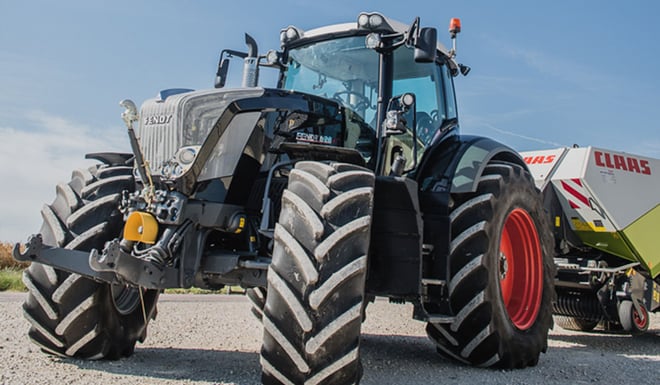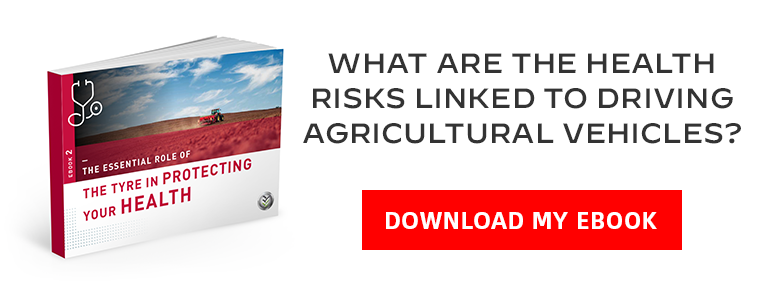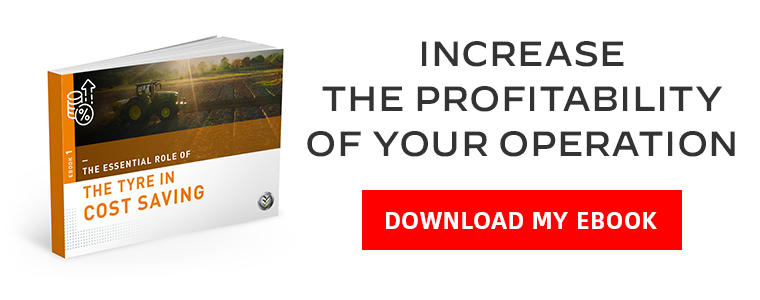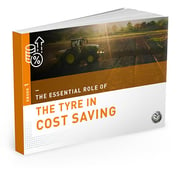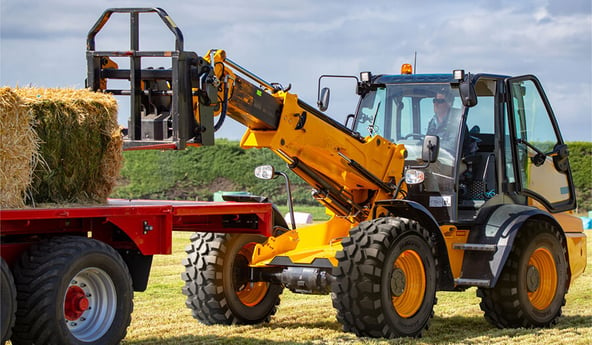Choosing the right type of tractor or agricultural tyre is not something to be taken lightly. Tyres are costly and have a direct impact on your productivity.
If the type you choose is unsuitable to your activities, you will either wear it out quickly or pay too much for it.
To find the tyre that’s most suitable for your tractor, ou should start by looking at how you will use your tyres, to choose between different designs, brands, qualities and prices. The choice is made more difficult by the fact that, over the past few years, manufacturers are adding more and more new options which you need to know about to be sure to work in the best conditions and to optimise your profitability.
Here is some advice to help you see clearer and make the right choice.
Which criteria should you consider when choosing the right agricultural tyre?
You choose your tyres ebased on technical criteria of course, but also practical criteria, in other words in relation to your environment and the type of work to be done. They also need to correspond to your specific expectations (comfort, efficiency, quality/price ratio).
Start by asking the right questions:
- What will you be doing with the tractor, what type of activity? Mainly in the fields? For transport? Or in the farmyard?
- Will the tractor be used for heavy work or for light work?
- Which type of soil are you driving on most frequently, the type of tool used and for which horsepower?
The answers to these questions will help you to choose the most suitable tyre for your tractor and for your most frequent activities.
The type of work to be done is a determining factor in the choice of tractor tyre
If your most frequent work is ploughing or tilling, you will need power and the tyres will need to provide a greater tractive force (increasing the load on the axle) than if your most frequent activity is light sowing work or spraying.
To optimise traction performance, you need to choose a tyre of the right size and to comply with the technical characteristics corresponding to the activity to be carried, as indicated on the tyre sidewall.
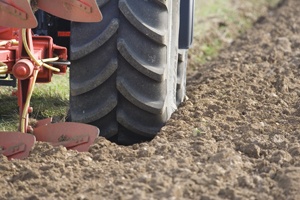
The size of the tyre
Your tractor’s original mount is rarely the most effective, it’s simply the cheapest for the manufacturer. By increasing the size of your wheels and of your tractor tyres, you will increase their efficiency: the tyre will compact the soil less as its surface contact will be wider, which will also reduce spinning, which means that you will also reduce your fuel consumption but more importantly, you will be able to carry a heavier load as the volume of air contained in a tyre is proportional to the weight that it carries.
When choosing, be careful to respect the preponderance: Once you have determined the maximum diameter of the back wheel of your tractor and chosen the most suitable new tyres, you need to calculate the size of tyre to mount on the front to avoid any problems of non-synchronisation between the front and rear axles. The preponderance rule allows a tolerance between 0 and 3%. At these percentages, comprise entre 0 et 3%. À ces pourcentages, it will be optimal and will enable your tractor to work at its full potential, its engine axles work in harmony.
The load index
The load index of your future tyre is extremely important: If you already know the weight of your machinery and you know how to calculate the load transfer on the tractor’s axles, then you can choose tyres with an “agricultural tyre load index” directly adapted to the weight of your existing machinery, your existing trailer and the reality of your farm activities.
The tyre’s speed rating
The tyre’s speed rating is the relationship between its load capacity and the speed of the tractor. The advantage of IF (Increased Flexion) or VF (Very High Flexion) tyres is that they have the same load capacity whatever the tractor’s speed.
The quality of your soil will have a great influence on your choice
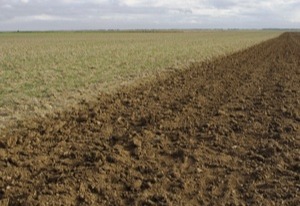
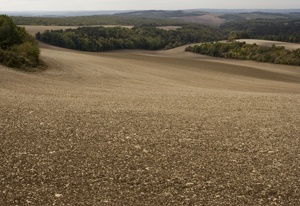
The efficiency of agricultural tyres
depends on the quality of the soil
It’s important to remember that the tyre’s efficiency and its grip, will depend on the quality of your soil. On loose soil, a hard tyre will dig in and move less well than a larger, more flexible tyre which distorts and rolls better. So, if you’re working on loose soil, a low-pressure tyre with a wide footprint and with a multi angular tread design is ideal. The lugs at the tyre surface will grip better and avoid spinning.
The notion of air pressure is important in your choice of tyres. For your tractor to have an efficient tractive force, you will generally need to reduce the air pressure to a minimum. There will be greater contact between the soil and the tyre resulting in increased motricity. However, the air pressure cannot be as low on the road as the tractor drives faster and the tyre will resist more due to excessive contact and will therefore wear out more quickly.
Some types of tyre are more flexible than others and therefore more forgiving in terms of adapting the pressure to the type of work to be carried out.
If you choose a standard tyre (known as a traditional radial casing), you will need to adjust the tyre pressure several times a day depending on your activities. Choosing an IF VF technology tyre gives you more flexibility. They can carry a heavier load for the same pressure.
The VF tyre is fully multipurpose. You will no longer need to adjust the tyre pressure when changing from field and road. This saves a lot of time.
Your comfort is directly linked to the quality of your tractor tyres
Your tyres can be responsible for the driver’s comfort to a certain extent.
 The vibrations
The vibrations
The tractor’s vibrations when driving, start with the tyres, go through the cabin, the front axle and the seat. Choosing a high-quality tyre can limit the level of vibrations. Air pressure is also a determining factor in generating vibrations. A more flexible and less inflated tyre will create less vibrations and be better for the driver.
The noise
The external bearing noise of the tyre is louder with a cheap agricultural tyre than with a high-quality tyre.
For more information on driver comfort, which could appear to be secondary, but which directly impacts the farmer’s health, you can download this complete book on the topic:
The financial element of your choice is made on two levels: the purchasing price and the operating cost
It is often wiser to make a technical investment than to pay a low purchasing price. Quality comes with a price, even for tyres, and the operating savings will be felt over the long term, while an initial saving upon purchase will be quickly forgotten.
- The choice of a tyre depends on its productivity. A low-pressure high technology tyre will allow you to be more productive by giving you possibility to carry heavier loads while providing an optimal tractive force. It protects your soil due its capacity to work with low air pressure and its large footprint causes less soil compaction to increase your profitability.
- Tyre quality has a direct impact on your fuel consumption. Improved motricity limits this consumption.
The Bridgestone-agriculture.eu blog is written and administered by farming tyre experts who are at hand to provide you with the advice you need about your tyres. They can help you to maximise your productivity with information on all tyre related topics: Technical data for farming tyres – Advice on agricultural tyre pressure – Solutions to avoid soil compaction – Sprayer tyre pressure – Why and how to ballast your tyres – The 6 key mechanical causes of abnormal wear to your tractor tyres - etc...
To take it a step further and increase the profitability of your farm, the tractor tyre Expert have prepared a free detailed ebook which explains the essential role of the agricultural tyre in your productivity.
Most people who read this article have also read some of the following articles which are listed by order of popularity:
This information is intended only to make you aware of the technical and functional aspects of agricultural tires and their use. It does not allow you to make a judgment or a definitive conclusion on a given problem. Only your agricultural tire expert is able to make a technical assessment and take a final decision, case by case.
Leave a
commentary
Your email address will not be published.
Required fields are indicated with *


